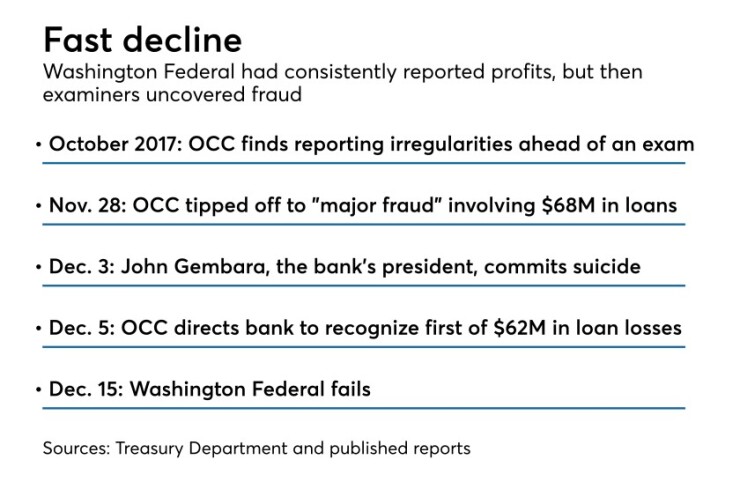A new set of indictments tied to the December 2017 failure of Washington Federal Bank for Savings alleges that four employees and several borrowers conspired to embezzle millions of dollars from the Chicago bank.
A federal grand jury in Chicago added James Crotty, a former vice president at the bank, to a list of defendants facing charges of falsifying bank records to conceal embezzlement from the Office of the Comptroller of the Currency and the Federal Deposit Insurance Corp.
The Justice Department announced in August that Rosallie Corvitte, the bank’s chief financial officer, and Jane Iriondo, its corporate secretary, had been indicted on charges of falsifying records and helping a customer commit embezzlement. Alicia Mandujano, a loan servicer, and Cathy Torres, a loan officer, were also charged.

The new charges are tied to roughly $31 million in bank funds that were allegedly embezzled, according to a press release from the FDIC's Office of Inspector General. Crotty and the other defendants have been accused of transferring the funds to four clients.
The latest indictments allege that at least $1.6 million of embezzled funds were used for the benefit of John Gembara, the bank’s former chairman, president and CEO. Gembara was found dead at a customer's home two weeks before the bank failed. The Cook County Medical Examiner’s office ruled the death a suicide.
Washington Federal Bank for Savings was closed when the OCC determined that it was insolvent and had at least $66 million in nonperforming loans. The FDIC
A subsequent review by an internal government watchdog agency determined that supervisory lapses at the OCC made the failure costlier to the Deposit Insurance Fund than it should have been.
The Treasury Department’s Office of Inspector General determined in a material-loss review released in November 2018 that if examiners had acted in a timelier manner, the fraud “may have been uncovered sooner and the loss to the DIF and individual account holders may have been reduced.”





